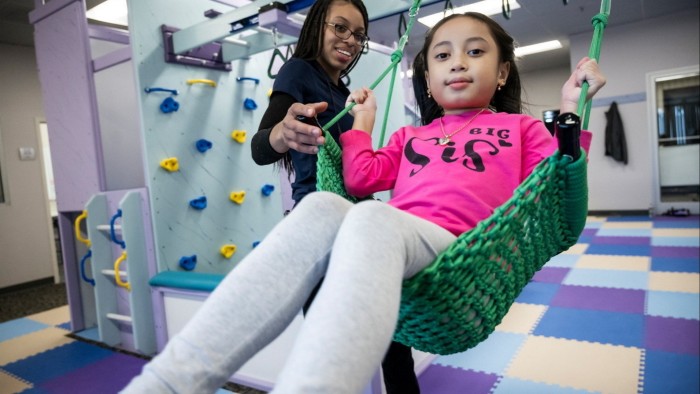ABA Centers of America had only its founder as an employee when it was set up five years ago with the aim of helping people with autism.
A rise in diagnoses of the neurodevelopmental condition has since spurred demand for ABA’s services.
“There is an increasing percentage in prevalence and incidence of autism that contributes to our rise,” says chief executive Jason Barker, adding that the company delivers a service that “is materially different”.
The group, which provides one-on-one sessions with behaviour therapists for those with autism spectrum disorder, today has more than 1,000 staff members and has recently clocked the region’s best growth rate.
ABA generated a compound annual growth rate of 595.3 per cent between 2020 and 2023 to top the Financial Times’ ranking of the Americas’ 300 fastest-growing companies.
The healthcare and life sciences industry is among the most successful sectors on the list, accounting for nearly 10 per cent of the fastest-growing companies. The sector has benefited from US companies providing staff with insurance plans that support businesses such as ABA and those providing fertility treatment.
ABA, meanwhile, is a personal endeavour for its founder Christopher Barnett, who spent years fighting to receive a diagnosis for his daughter and gain access to appropriate treatment.
Like the Barnetts, other American families face long waiting lists to have a child assessed. Nearly two-thirds of speciality care centres in a 2023 survey by Cognoa, a child development and behavioural health company, reported waiting times of more than four months between an initial evaluation request and an assessment. This can stretch to years in some cases.
ABA’s success comes at a time when more than 3 per cent of school-aged children in the US have been diagnosed with ASD, a paper from the Centers for Disease Control and Prevention shows.
The study collected data in 2022 and found prevalence of ASD among children aged 8 had risen from previous years. The figures highlight the need for “enhanced planning to provide equitable diagnostic, treatment and support services for all children with ASD”, the paper said.

ABA Centers says it will typically have a child seeing a therapist within 47 days. The therapist will work with the child at home and in clinics for up to 40 hours a week.
US legislation and state-level mandates have increased access to ABA therapy coverage through insurance plans. By 2019, every American state had put in place requirements for corporate schemes to include the treatment of autism.
“All of a sudden, you have kids, [who] otherwise would have gone without care because their parents couldn’t afford it, [with] a health plan coverage that means they can actually get the care,” says Barker.
The increased emphasis on corporate benefits has also prompted a surge in demand for surrogacy and egg donation agencies, such as Patriot Conceptions, which focuses on military families, and Progyny.
As many as 70 per cent of US companies with more than 20,000 employees and nearly half of those with more than 500 employees provide insurance for in vitro fertilisation, the latest data from the workplace consultancy Mercer shows. That is double the coverage five years ago.
Meanwhile, technology has evolved partly because demand for fertility treatment in the US has surged as many women opt to give birth at a later age. One in six people globally will struggle with fertility, the World Health Organization said in 2023.
Patriot Conceptions, ranked 41 and founded by US army veteran Haotian Bai, uses artificial intelligence to match surrogates and intended parents. “The unique stresses of military life — deployments, separations, environmental exposures — can take a toll on fertility,” says Bai.
“Our proprietary matching algorithm goes beyond surface-level criteria,” he adds. “It analyses hundreds of data points — medical history, psychological profiles, location preferences, communication styles, personal values — to facilitate faster, more compatible, and ultimately more successful matches.”
This reduces waiting times and the “emotional strain” on both parents and surrogates, says Bai, and has resulted in hundreds of babies being born into military and veteran families. “From the outset, we integrated AI not as a replacement for the human touch, which is paramount in this journey, but as a powerful enabler,” he says.
The group had a compound annual growth rate of 121.3 per cent from 2020 to 2023.
Progyny, set up in 2008 and ranked 190 in 2025, manages a network of specialists across the US to offer fertility, post-partum and menopausal care to millions of women.
Peter Anevski, its chief executive, says it is “a reality” that women are struggling with fertility yet “unnecessary coverage gaps have persisted for far too long”.
Employers and health plans now recognise the need for a more comprehensive approach and, as a result, Anevski says the company has grown extensively. “With more than 530 leading employer clients and 6.7mn [people covered] under our belt, we’re only just getting started,” he says.
Source link









